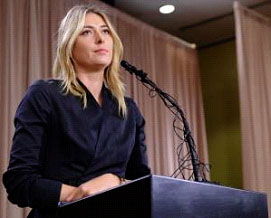LOS ANGELES, (Reuters) – Russian tennis star Maria Sharapova, the highest-paid woman in sports, said yesterday that she failed a drug test at the Australian Open due to a substance she has been taking for 10 years for health issues.

The 28-year-old Sharapova, a five-time grand slam champion, will be provisionally suspended starting March 12, the International Tennis Federation (ITF) said.
She tested positive for meldonium, which is used to treat diabetes and low magnesium, and was only banned by the World Anti-Doping Agency as of Jan. 1.
“I made a huge mistake. I let my fans down and I let the sport down,” said Sharapova, a teenage tennis prodigy who became the third-youngest Wimbledon champion. “I take full responsibility for it.”
“I know that with this I face consequences and I don’t want to end my career this way. I really hope that I will be given another chance to play this game,” former world No.1 Sharapova told a news conference in a downtown Los Angeles hotel.
According to Forbes, she earned $29.5 million in 2015, mostly from endorsements.
Sharapova said her family doctor had been giving her mildronate, which is also called meldonium, for 10 years after she frequently became sick, had irregular EKG results, a magnesium deficiency and a family history of diabetes.
“It is very important for you to understand that for 10 years this medicine was not on WADA’s banned list and I had been legally taking the medicine. But on January the first, the rules have changed and meldonium became a prohibited substance.”
The World Anti-Doping Agency, or WADA, declined to comment until ITF issues a final decision.
Meldonium is used to treat chest pain and heart attacks among other conditions, but some researchers have linked it to increased athletic performance and endurance.
It is not approved in the United States but is available in Russia, Latvia and other countries in that region. Over the past month, Russian cyclist Eduard Vorganov, Russian figure skater Ekaterina Bobrova and Ethiopia-born athletes Endeshaw Negesse and Abeba Aregawi have all tested positive for meldonium.
The stunning news came a day after Sharapova’s management team said she was going to make a “major announcement,” which had many speculating that she was going to announce her retirement from professional tennis.
Sharapova, who has struggled with a series of injuries in recent years, has not competed since she lost to Serena Williams in the quarter-finals of the Australian Open in January.
Renowned for her never-say-die approach, a gritty baseline game and high-decibel shrieking, Sharapova at 17 became the first Russian woman to win Wimbledon when she beat Serena Williams 6-1 6-4 in the 2004 final.
That victory also made her the third-youngest Wimbledon champion, behind only Lottie Dod and Martina Hingis, and the fourth-youngest grand slam winner in the open era after Hingis, Monica Seles and Tracy Austin.





